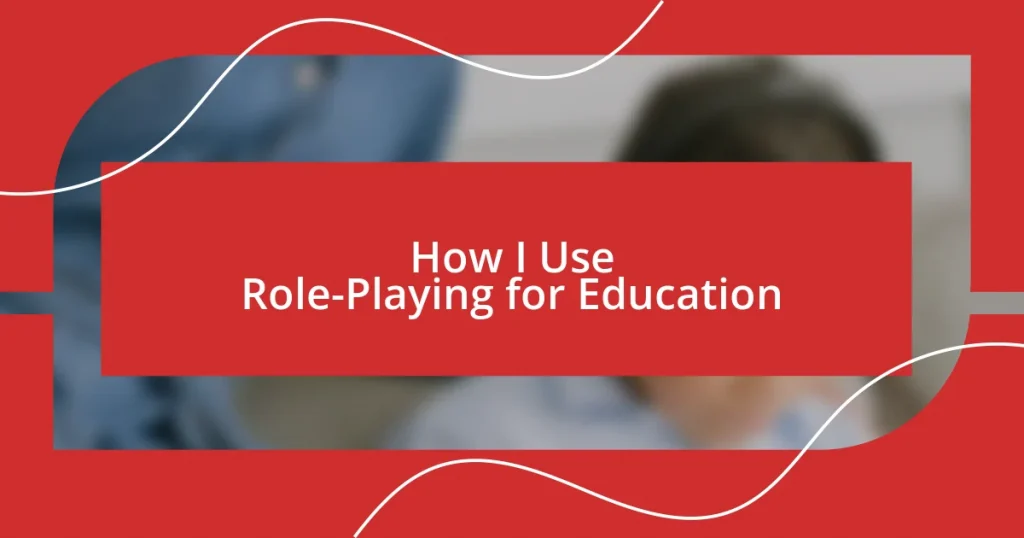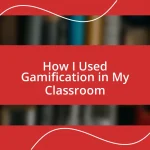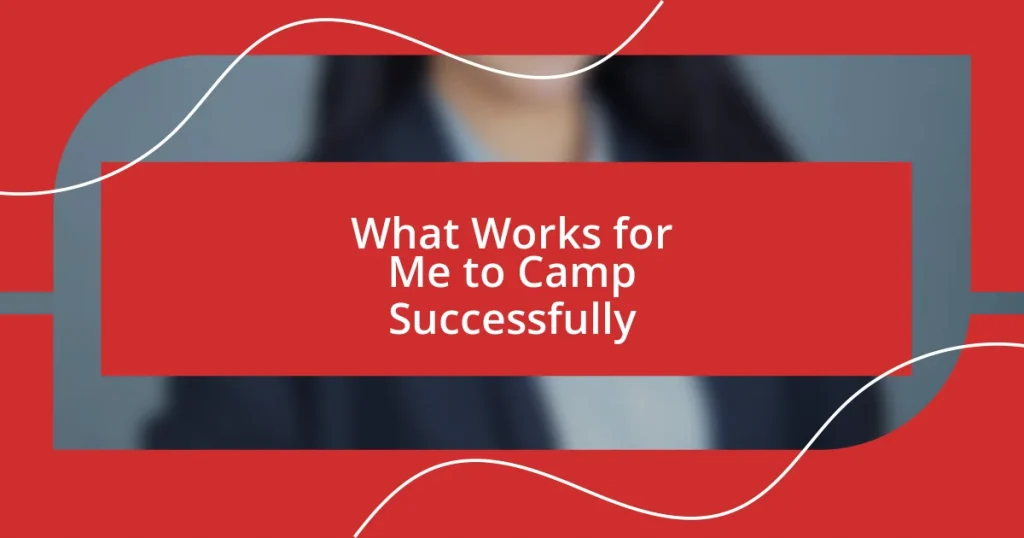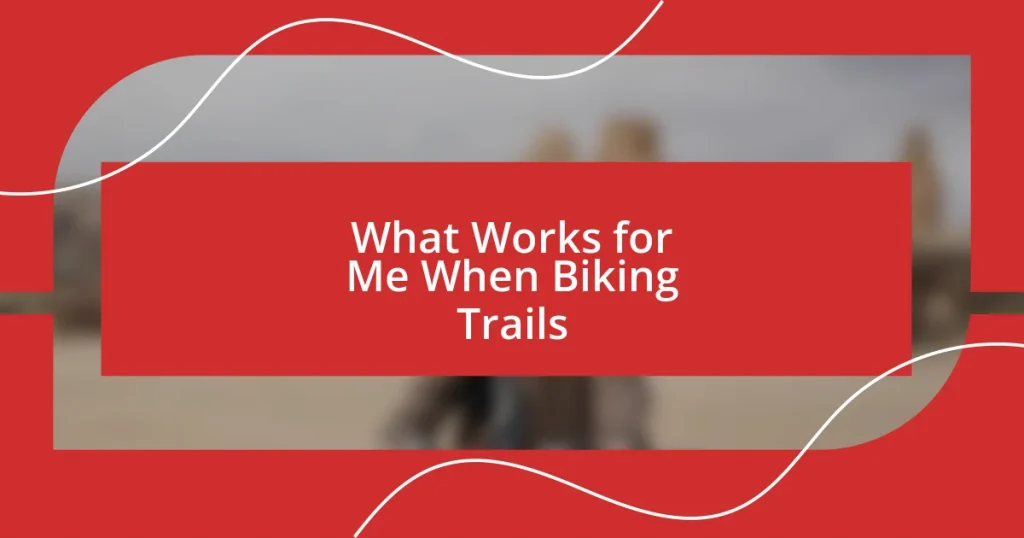Key takeaways:
- Role-playing enhances engagement, empathy, and emotional intelligence, allowing students to explore different perspectives and develop key social skills.
- Effective role-playing scenarios should have realistic contexts, clear roles, and incorporate feedback and reflection to deepen the learning experience.
- Assessing student learning outcomes through peer evaluations and reflective journaling promotes ownership of learning and encourages meaningful discussions about real-world implications.
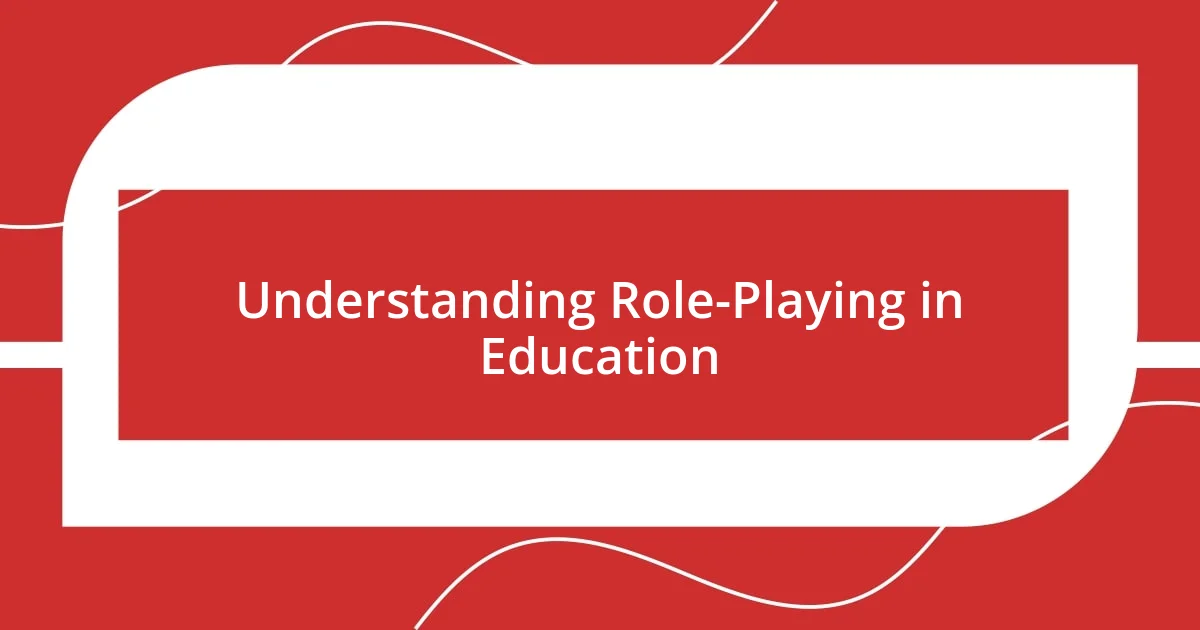
Understanding Role-Playing in Education
Role-playing in education is an innovative method that transforms the learning experience by placing students in realistic scenarios. I remember a time when I facilitated a mock courtroom setting for a civics class; students took on the roles of lawyers, defendants, and jurors. It was incredible to see their engagement grow as they debated real cases—who knew learning could feel like such an adventure?
This technique does more than just hold attention; it deepens understanding and fosters empathy. When students embody different perspectives, they not only grasp theoretical concepts but also develop emotional intelligence. Isn’t it fascinating how stepping into someone else’s shoes can pave the way for compassion and collaboration? I’ve seen students who were once quiet emerge as confident leaders when given the chance to role-play.
Moreover, role-playing enables safe experimentation with decision-making skills. In one instance, I observed a group of students navigating a complex ethical dilemma related to business practices. The discussions that followed were rich and revealing. They explored not only the consequences of their choices but also the values that inform those decisions. This kind of exploration is crucial in helping young minds prepare for a world that often calls for critical thinking and moral reasoning.
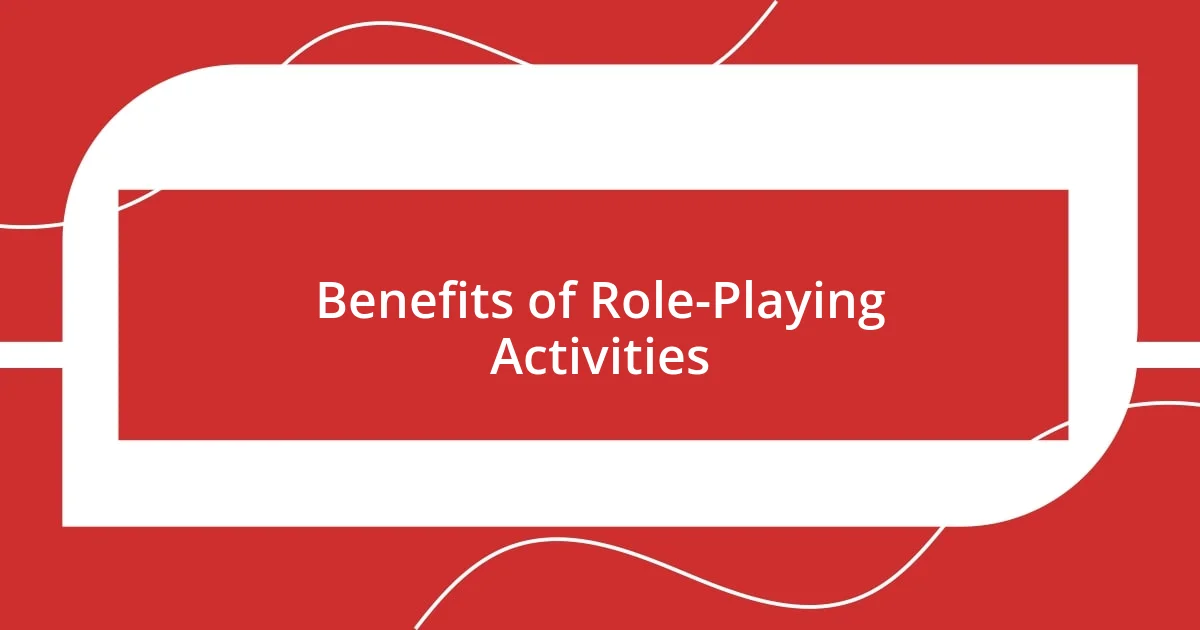
Benefits of Role-Playing Activities
One major benefit of incorporating role-playing activities in education is the enhancement of communication skills. I recall a session where students practiced job interviews by switching roles between interviewer and candidate. It was remarkable—students who often struggled to articulate their thoughts suddenly found their voices. This shift not only built their confidence but also made them more aware of body language and tone, essential components of effective communication.
- Improves problem-solving abilities, as students confront real-world scenarios.
- Fosters teamwork, encouraging collaboration among peers.
- Builds critical thinking skills through analysis of different roles and viewpoints.
- Encourages active participation, making learning more dynamic and engaging.
Another significant advantage is the promotion of creative thinking. I remember facilitating a marketing project where students had to sell a quirky product, like a time machine made from household items. Watching them brainstorm and develop unique pitches was a joy to behold. It became a playground for ideas, where unconventional thinking was celebrated. Such activities empower students to innovate and think outside the box, skills that are invaluable in today’s rapidly evolving world.
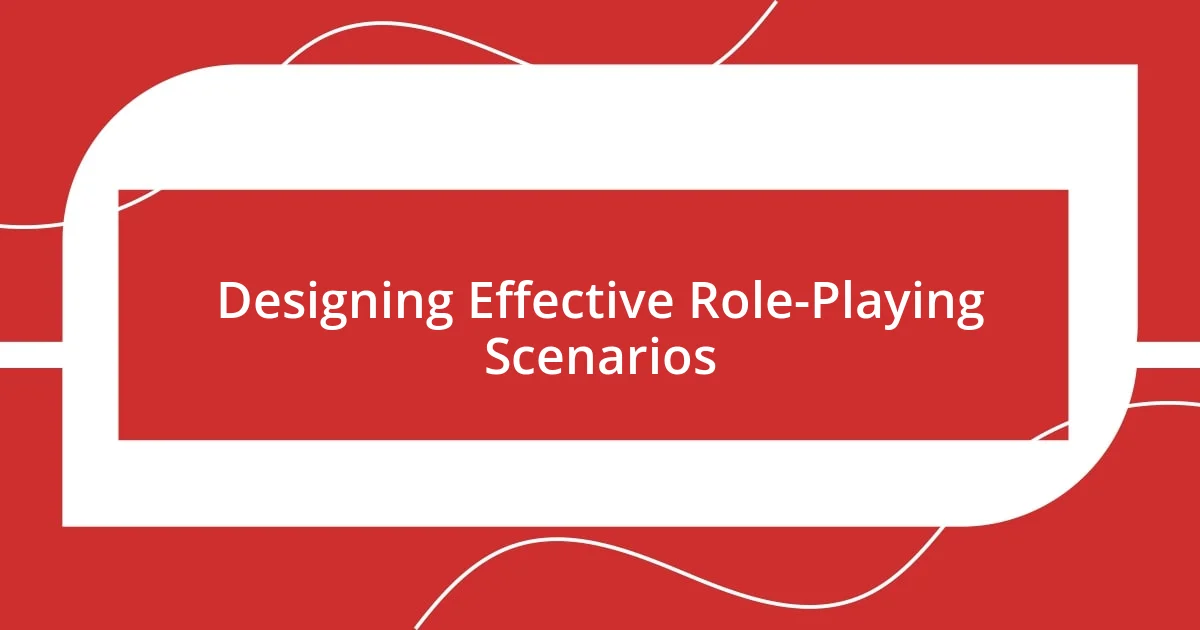
Designing Effective Role-Playing Scenarios
Designing effective role-playing scenarios requires a careful balance of realism and educational objectives. I often start by imagining the context in which the role-play will take place. For instance, if I’m creating a scenario about community planning, I might draw from real-life city council meetings I’ve attended. By incorporating genuine challenges and current issues, students can connect more meaningfully with the material. This connection not only sparks interest but encourages deeper discussions, as they can see the relevance to their own lives.
Another aspect I focus on is the clarity of roles and objectives. Each participant should understand their responsibilities and the goals of the scenario. I vividly remember a situation where I introduced a role-play about environmental conservation. I clearly outlined the roles of activists, business owners, and local government officials. As discussions unfolded, the students resonated with their roles, and I could see their excitement grow. They were not just learning; they were actively participating in a debate that felt real and urgent to them.
Lastly, feedback and reflection are crucial for effective scenarios. After a role-playing session, I facilitate a debriefing segment where learners can express their feelings about the experience. I once had a student share how stepping into the role of a business owner made her reconsider her views on profit and sustainability. This kind of reflection enriches the learning process, allowing students to process and internalize what they’ve experienced, making it truly impactful.
| Aspect | Importance |
|---|---|
| Realistic Context | Increases relevance and engagement |
| Clear Roles | Ensures understanding and effectiveness of participation |
| Feedback and Reflection | Deepens learning and personal growth |
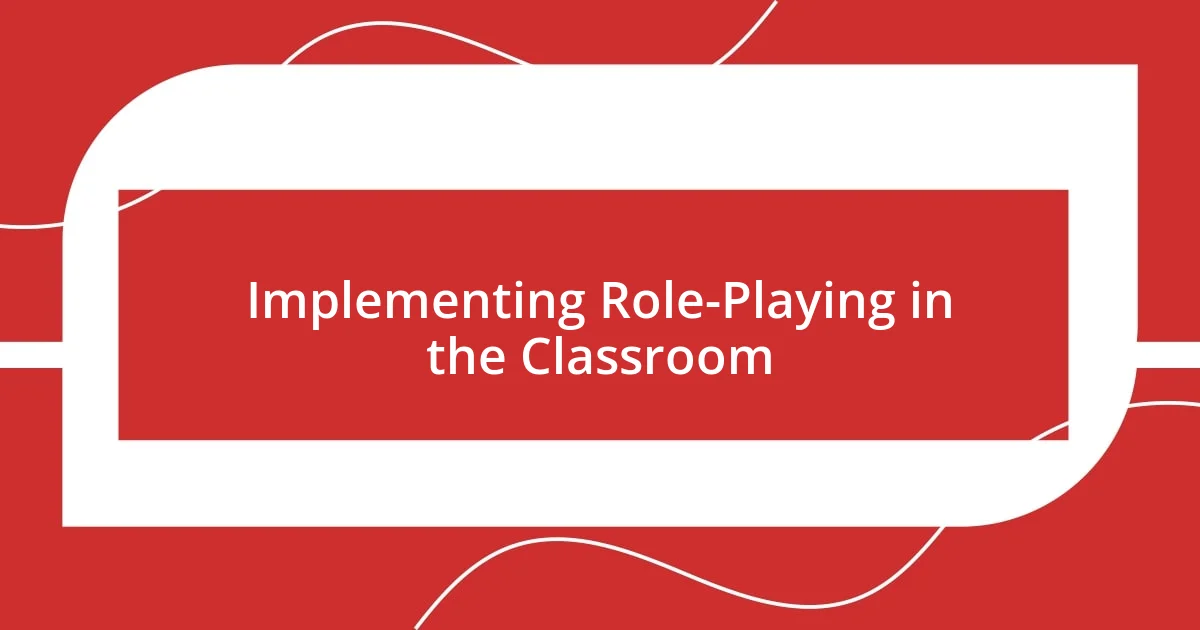
Implementing Role-Playing in the Classroom
Implementing role-playing in the classroom isn’t just about acting; it’s about creating an immersive experience that bridges theory and practice. I always begin by establishing a safe environment where students feel inspired to explore. One time, I introduced a scenario where students had to negotiate peace treaties, and the energy in the room was palpable. As they navigated their roles, I watched them grapple with complex emotions—frustration, excitement, and sometimes empathy. Isn’t it fascinating how stepping into someone else’s shoes can lead to these profound realizations?
Reflection plays a pivotal role in solidifying the learning that occurs through role-playing. After each session, I encourage my students to share their thoughts and feelings about their experiences. I vividly recall a student who played the part of a community organizer during a mock city council debate. When she later disclosed how she felt overwhelmed and nervous yet empowered, it became clear that role-playing reaches deeper than just the surface knowledge of subject matter; it fosters emotional intelligence. How often do we give students the space to articulate these essential insights?
Another key element is the adaptability of role-playing scenarios to fit diverse learning styles. I often modify activities to include visual aids or even digital tools, which cater to tech-savvy learners. There was a memorable instance when I had students create their own informational websites as part of their role-play about historical figures. This blend of technology and creativity sparked amazing discussions, making the historical context come alive in ways textbooks simply can’t. It’s amazing how flexible role-playing can be—it truly meets students where they are and elevates their engagement.
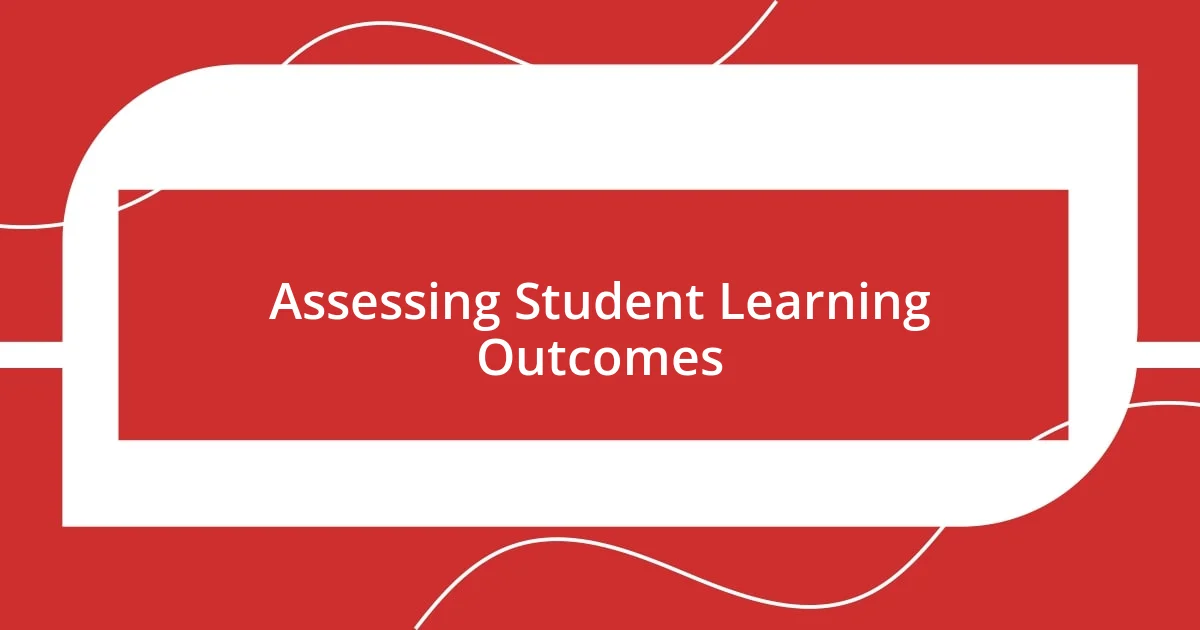
Assessing Student Learning Outcomes
Assessing student learning outcomes in role-playing often leads me to insightful moments that really highlight their understanding. During a recent scenario focused on climate policy, I quickly realized the students grasped the complexities of negotiation and compromise. It wasn’t just about their knowledge of the topic; it was evident in how they articulated their positions and collaborated with one another. They were taking ownership of their learning, which is always a rewarding sight for me.
In my experience, using targeted assessments, like reflective journals or peer evaluations, greatly enhances this process. I remember introducing a simple rubric after a debate role-play on social justice issues. Students rated their peers on criteria like collaboration and understanding of different viewpoints. When they reviewed each other’s performances, discussions blossomed—not only were they critiquing, but they were also learning from one another’s perspectives. Isn’t it remarkable how peer feedback can encourage that level of introspection and growth?
To further shape the learning outcomes, I utilize follow-up discussions where students can connect the dots between role-play and real-world implications. Once, after a mock international summit, a student passionately debated how diplomacy shapes global relations. This sparked a conversation that went far beyond the classroom, illustrating the value of role-playing in solidifying their understanding of complex subjects. It’s these moments that remind me of the true power of experiential learning in education.
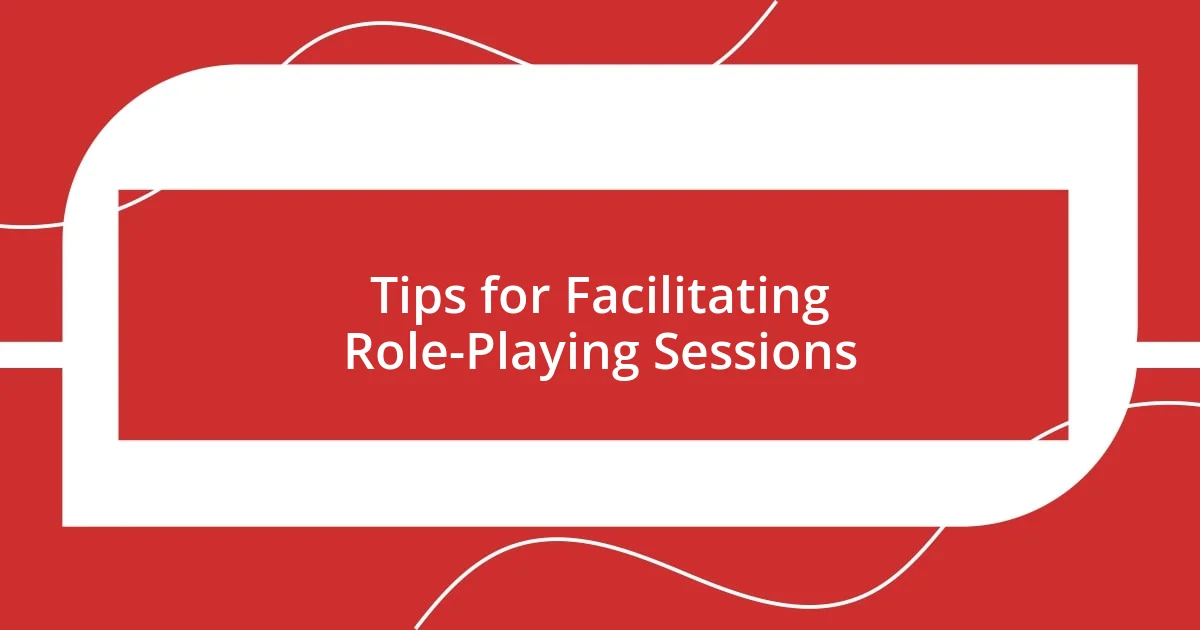
Tips for Facilitating Role-Playing Sessions
Creating an inclusive atmosphere is essential when facilitating role-playing sessions. I always remind myself that students should feel comfy exploring different roles. A memorable moment for me was during a role-play about environmental policy, where one shy student who typically hung back stepped up and passionately defended her character. It was a revelation—not only for her but for her classmates, who began to see each other’s strengths in ways they hadn’t during regular activities. How incredible it is to witness benefits like boosted confidence from simply embracing a new perspective!
Setting clear expectations beforehand is also vital. Before each session, I outline the goals and rules, which helps everyone stay focused and engaged. I once conducted an exercise on historical conflicts where I explicitly stated that respectful dialogue was non-negotiable. The outcome was stunning; students held balanced discussions that reflected their understanding of nuanced issues. I was struck by how these straightforward guidelines can transform a chaotic session into a journey of shared learning. Have you ever noticed how clarity can empower participants to express their viewpoints more freely?
In addition, utilizing debriefing sessions post-role-play is essential for reinforcing learning. After a dramatic scenario on social dilemmas, I asked my students how they felt embodying their characters. One student remarked that stepping into the shoes of someone marginalized opened his eyes to struggles he hadn’t fully recognized before. Moments like these remind me of the lasting impact role-playing can have. It makes me wonder—why don’t we tap into such powerful discussions more often?









